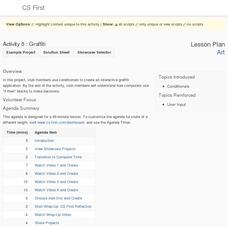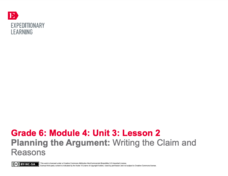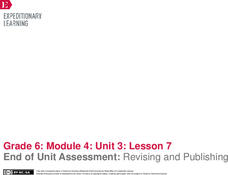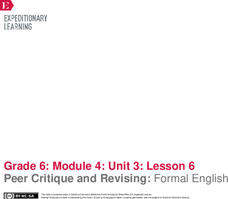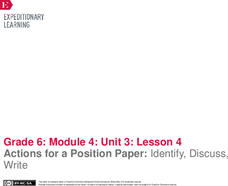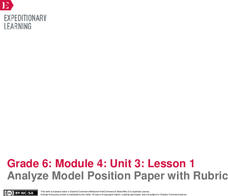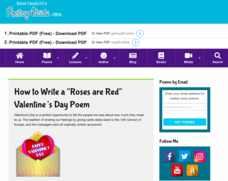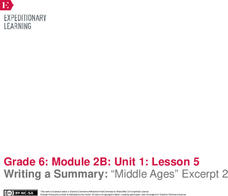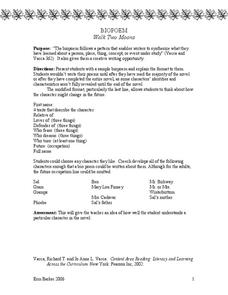Poetry4kids
How to Write a Limerick
Add a little fun and fancy to English language arts with an activity that challenges scholars to write a limerick. Authors follow five rules in order to compose an original poem that contains a specific rhyme scheme.
Bermingham City Schools
Opinion Writing
It's no secret that children can be very opinionated, but rather than fight against this natural tendency, embrace it with this primary grade writing project. After a shared reading of a children's book about persuasion, young learners...
Poetry4kids
How to Write a Diamante Poem
A lesson begins with a description of a diamante poem and the rules to follow while writing one. Scholars examine the ins and outs of synonym and antonym diamantes, then compose an original poem using their newfound knowledge.
Poetry4kids
How to Write a Concrete or “Shape” Poem
Writers compose an original shape poem. Scholars choose a subject to write about and create a visual representation by forming a corresponding picture using the poem's words.
Google
Art: Graffiti
Your principal won't mind graffiti, as long as it's on a virtual wall. Scholars use the Scratch block-based computer language to write a program on graffiti. The program lets users place certain designs on a wall.
K12 Reader
Revise Your Writing
The importance of revising writing is the focus of a short reading comprehension worksheet that asks readers to respond to a series of questions based on the article.
EngageNY
Mid-Unit Assessment: Completing My Draft Position Paper
What's the difference? Scholars analyze the similarities and differences between introductory and concluding paragraphs. Then, using a model essay as a guide, they write their draft position papers.
EngageNY
Planning the Argument: Writing the Claim and Reasons
Step up! Using the resource, scholars discover the six steps to writing an effective position paper. Next, they work on a graphic organizer to begin planning their argument-based essays.
Denton Independent School District
Elements of Art: Name Design Project
Introduce your class to the seven elements of art through a presentation and related project. Before beginning the project, class members take notes on the presentation, writing down the underlined items and adding drawings into their...
Valhalla Free Union School District
End of the Year Writing Portfolio Project
Ask class members to reflect on their year-long writing experience by creating a portfolio of their work. Here's a resource that details what should be included in such a portfolio, and provides a rubric that can be used to assess the...
EngageNY
Planning for Writing: Introduction and Conclusion of a Literary Analysis Essay
First and last impressions are important. Using the helpful resource, scholars draft the introductory and concluding paragraphs of their literary analysis essays. Next, they use a writing evaluation rubric to self-assess their work.
EngageNY
Performance Task Preparation: Peer Critique and Mini-Lesson Addressing Common Errors: Revising Draft Essay to Inform
Time to revise! Using a writing evaluation rubric, scholars participate in a peer editing process to provide feedback on each others' informative essays. Next, pupils begin revising their drafts based on the feedback they receive.
EngageNY
End of Unit Assessment: Revising and Publishing
Dictionaries, thesauruses, word walls, oh my! Pupils use several resources to revise their position papers to include appropriate vocabulary. Then, after peer editing, scholars write the final drafts of their essays and self-assess using...
EngageNY
Peer Critique and Revising: Formal English
Dear Sir or Madam: What's the difference between formal and informal language? Scholars focus on using formal English and transitions in their position papers. After revising their rough drafts, they engage in the peer editing process...
EngageNY
Actions for a Position Paper: Identify, Discuss, Write
Anchors aweigh, it's time to write! After viewing an anchor chart detailing the parts of a position paper, pupils share their plans for their essays with a partner. Next, they write the rough draft of their body paragraphs.
EngageNY
Analyze Model Position Paper with Rubric
It's time to choose a position! Scholars read a model position paper about fracking to practice identifying the topic and argument. Then, working with a partner, they use a rubric to assess the essay.
Schoolwires
12th Grade Expository Reading and Writing Research Project
The beauty in this resource is the lengthy list of highly charged, controversial-issue research topics. Categories include issues of race, politics, law, environment, education, athletics, gender, and technology. After selecting a topic,...
EngageNY
End of Unit 3 Assessment: Writing a Research Synthesis
Ready, set, write! Scholars work on the end-of-unit assessment by completing a writing prompt. They then look at the model performance task from instructional activity two to create a rubric for scoring the exercise. Using turn and talk,...
EngageNY
Writing to Inform: Analyzing a Model Using a Rubric
Learn to write right. Scholars analyze the model essay Adversity Faced by Townspeople in the Middle Ages. They discuss the essay and make annotations working with an elbow partner. Learners then take another look at the essay using a...
Poetry4kids
How to Write a “Roses are Red” Valentine’s Day Poem
Compose a Valentine's Day poem! Practicing their rhyming skills, scholars follow the traditional format to create a happy poem for a friend or family member.
Scholastic
Writing Letters of Gratitude
A lesson begins with a discussion on gratitude—what does it mean, and for who are learners thankful? Scholars share their thoughts and feelings then choose a community worker to which they wish to share their gratitude. Writers compose a...
EngageNY
Writing a Summary: “Middle Ages” Excerpt 1
What's this all about? Scholars learn the importance of summarizing skills using a summary writing graphic organizer. They work with an elbow partner to discuss summaries and complete the organizer using Middle Ages Excerpt 1. Learners...
EngageNY
Writing a Summary: “Middle Ages” Excerpt 2
What is the big idea? Scholars use Middle Ages Excerpt 2 to complete a summary graphic organizer. They then use the information from the organizer to write a summary of the text on lined paper. Learners share summaries with the class.
Novelinks
Walk Two Moons: Biopoem
Middle schoolers describe the characters of Walk Two Moons as they write biopoems. Following the pattern provided, young writers depict their chosen characters' traits and experiences to make their poems unique.






